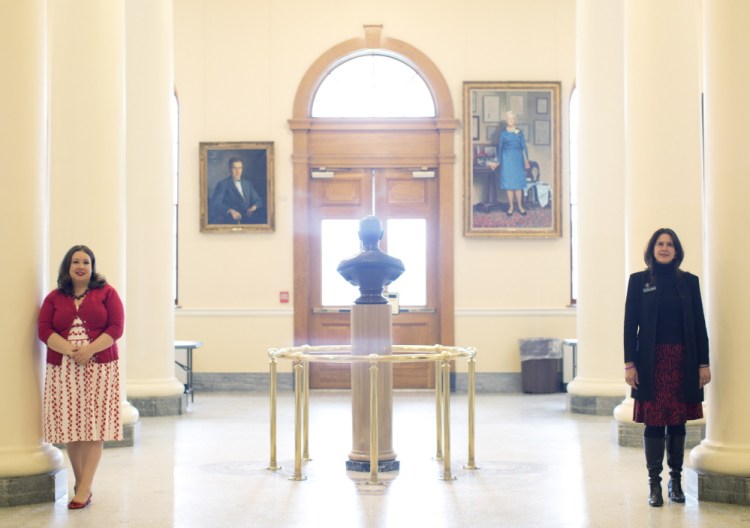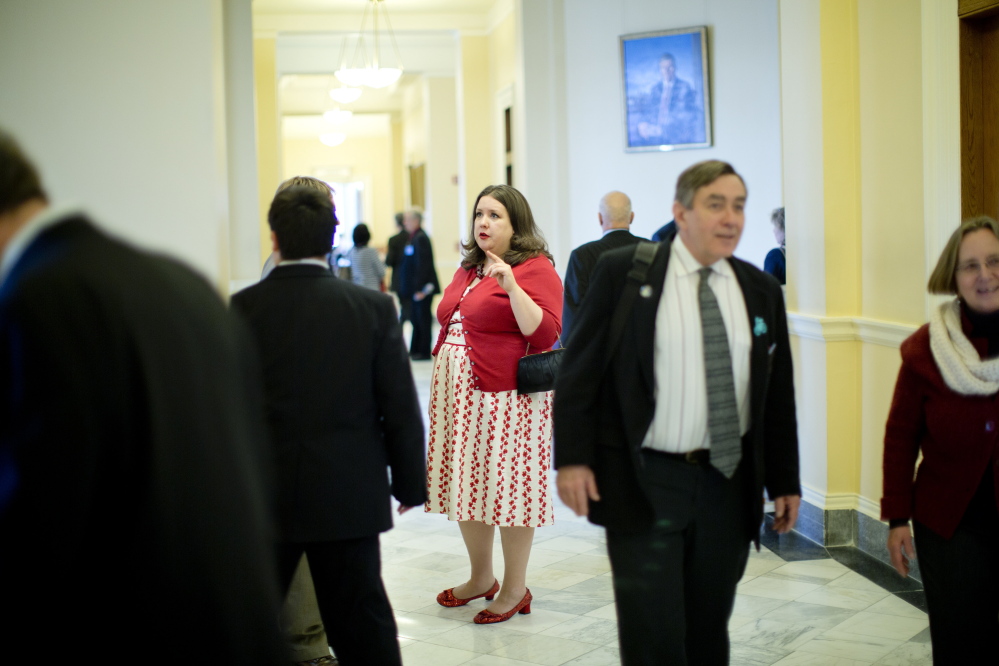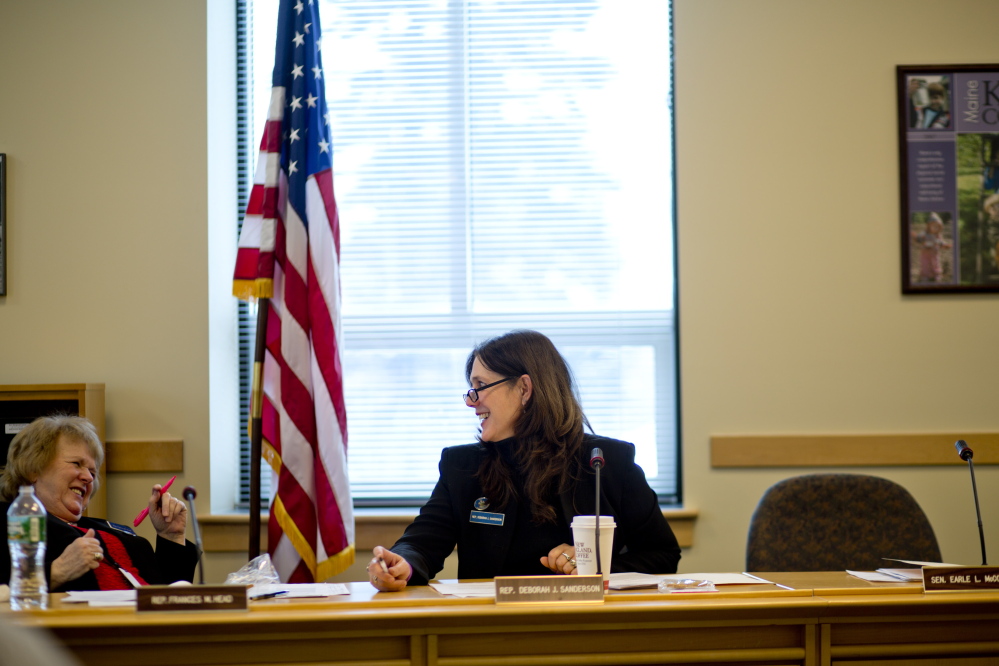AUGUSTA — Reps. Deborah Sanderson and Diane Russell are not likely to grab a drink together after a long day at the State House.
Sanderson, a Republican, is a mother of five children and stepchildren from Chelsea, a reliably conservative community just south of Augusta.
She opposes abortion, helped lead Gov. Paul LePage’s fight last year against expanding Medicaid in Maine and thinks labor unions have too much power.
Russell, a Democrat, is single and lives on Portland’s Munjoy Hill, as liberal a neighborhood as you are likely to find in Maine.
She supports abortion rights, thinks welfare recipients are unfairly vilified and once traveled to Wisconsin to protest Gov. Scott Walker, who was making national headlines in his fight to weaken public-sector unions.
Fundamentally, there is little the two representatives agree on when it comes to public policy.
Yet in the 127th legislative session now underway, Sanderson and Russell have found common ground on one hot-button issue: improving and expanding access to medical marijuana.
The two have become leading advocates, and likely will remain so, on the handful of bills submitted so far that seek to make changes to Maine’s 12-year-old medical marijuana law.
MEDICAL MARIJUANA A UNITING ISSUE
One of Russell’s bills would remove the five-patient limit for caregivers who grow marijuana, which would give them a decent chance at earning a living, she said.
Another bill would allow doctors to prescribe medical marijuana for any condition, not just the dozen or so outlined in law, including Alzheimer’s disease, cancer, glaucoma, HIV/AIDS, multiple sclerosis and post-traumatic stress disorder, which was added only last year.
Sanderson said she’s likely to support both, and she could help bring other Republicans along.
The two representatives also have co-sponsored a bill by Sen. Eric Brakey, R-Auburn, that would allow patients to use medical marijuana while in a hospital.
It’s only the seventh time their names have appeared together on the same bill in the five years they have served together in the Legislature – noteworthy because many bills have dozens of co-sponsors.
Support from these politically divergent lawmakers highlights the uniqueness of the medical marijuana debate, not just in Maine but across the country.
While most political compromise often comes from Democrats and Republicans each moving to the middle, members of the two major parties have found they can agree on the topic of medical marijuana without having to sacrifice their core beliefs.
“There is a bit of a nexus between civil libertarians on the right and left,” said David Boyer, director of the Marijuana Policy Project. “They may not agree on economic issues facing Maine, but they seem to find common ground how best to use this medicine.”
EARLY AND PERSISTENT ADVOCATE
Russell, 38, who was first elected to the Maine House of Representatives in 2008, has long been a Democratic Party leader on medical marijuana.
She staked out her position early, when the issue was much more controversial, and did so at the risk of becoming an outsider, although that never bothered her.
“I was never one of the cool kids,” she said. “But I’ve always felt you should stand up for what you believe in.”
On the subject of medical marijuana, Russell said that was an easy issue to get behind.
Although the stigma of the drug – still illegal under federal law – persists, it has been easier to build consensus. The public overwhelmingly supports medical marijuana – 86 percent, according to a poll last year conducted by Gallup.
That’s why Russell continues to introduce bills each session, even if identical versions have failed in the past.
This year, she wants to eliminate the five-patient limit for caregivers because she thinks the current system is just asking to be taken advantage of.
“Caregivers can’t make a living growing 30 plants,” she said.
She also wants to eliminate the language in state law that says medical marijuana patients must have a qualifying condition to receive medicine.
In 2009, voters expanded the list of conditions as part of a wide-ranging referendum that brought the Medical Marijuana Act up to date. In the last session, lawmakers added post-traumatic stress disorder, after much debate.
POLITICIANS OUT OF DOCTOR OFFICES
Since that referendum six years ago, the medical marijuana industry has grown considerably in Maine.
The state does not currently keep track of all patients because registration is voluntary, but the number of licensed caregivers has grown from 236 in 2011 to 1,720 last year. Each caregiver is allowed to grow for up to five patients, although not all do.
Russell said the growth in caregiver numbers is good, but she doesn’t think the law should limit which conditions are acceptable.
“It’s really about getting politicians out of the doctor’s office,” she said. “You don’t want me diagnosing your diabetes.”
In many ways, Russell said, marijuana has been a bridge issue for Republicans and Democrats.
“It’s not cool right now to hang out with the other party,” she said. “This issue allowed us to sort of not be at a middle school dance.”
Despite her willingness to compromise on this issue, Russell, who has unsuccessfully run for the position of House speaker, has been a partisan Democrat, sometimes unabashedly so.
In 2013, she submitted a bill to sell the Blaine House, then occupied by Gov. Paul LePage, a move even members of her own party decried as a stunt.
REPUBLICAN’S POSITION EVOLVES
Sanderson, 52, was not always on board with medical marijuana.
In 2009, before she was a lawmaker, she voted against the citizens initiative that expanded Maine’s Medical Marijuana Act.
“I was guilty of casting stigma upon the use of marijuana for medical purposes,” she said.
A year later, after she won her first election to the House, a constituent asked her to draft a bill that would remove the requirement for medical marijuana patients to register with the state.
“I wanted nothing to do with it, but I did take the bill on for the constitutional issue, the privacy issue,” she said.
To craft that bill and shepherd it through the Legislature, Sanderson said she did a lot of research. She talked to doctors. She talked to caregivers. She talked to patients.
One of the people she talked to credited medical marijuana as the only medicine that provided comfort to a sick child, and her position changed.
“I have become a huge advocate for this program, but it’s only because I became educated,” she said. “I think the general public is now starting to see it, too.”
NO CASTIGATION FROM HER PEERS
Sanderson, who like Russell has flirted with leadership positions, does not appear to be afraid to step away from the party line.
Last summer she endorsed Bruce Poliquin over moderate Kevin Raye in the 2nd District congressional primary.
She also has aligned herself with the “liberty” wing of the Republican Party in Maine, which made waves in 2012 by hijacking the state convention to support libertarian Ron Paul over Mitt Romney, the more mainstream candidate, in the presidential primary.
She, too, has been a frequent critic of Democrats, particularly House Speaker Mark Eves, but also has touted her ability to work with the other party on certain issues.
Last year, Sanderson worked closely with Rep. Sara Gideon, D-Freeport, on a bill that would expand access to the drug naloxone, which can help prevent heroin overdoses.
“That was a bill that was destined to die, and it got passed unanimously and it helped the people of Maine,” she said.
Asked whether she has gotten any push-back from Republicans or constituents for leading the fight for medical marijuana, Sanderson said it’s been the opposite.
“I have had a number of people come up to me, who I never would have known or suspected were a medical marijuana user, and said ‘Thanks,’ ” she said.
BACKING LEGALIZATION REFERENDUM
The debate over expanding access to medical marijuana in Maine exists on a parallel, but entirely separate, track with the debate over legalization.
Two competing groups are gearing up for a 2016 citizens initiative to legalize marijuana for all uses.
Russell is on board. She has introduced multiple legalization bills as a lawmaker, and all have called for a statewide vote.
Sanderson said she’s not going to lead on legalization, but also said she’d support a citizens initiative.
“My concern is how legalization would affect the medical marijuana program,” she said.
Sanderson said she likes the incremental approach to Maine’s medical marijuana law.
“It will take time to get it where it needs to be, but we’re on a good trajectory,” she said.
Her stance on removing the provision that says patients must have a qualifying condition is remarkably similar to Russell’s.
“We don’t prohibit doctors from prescribing opioids,” Sanderson said. “(Marijuana) is the only form of medicine where you need permission from the state.”
DIFFERENCES ON REGULATION LIKELY
Boyer, of the Marijuana Policy Project, said that although lawmakers like Russell and Sanderson may agree in principle on expanding access to medical marijuana, they likely don’t agree on how the system should be regulated.
Politically, he said he’s closer to Sanderson, yet he has come to respect Russell for her passion on the issue. But Boyer admitted he’s had to tell Russell to stop saying, “Let’s tax the hell out of it.”
“Just taxing it is fine,” Boyer said.
Sanderson said some regulation is fine, but she doesn’t want to go overboard. That’s why she agreed to champion the 2010 patient privacy bill. Asking patients to register their personal information with the state went too far, she said.
Asked whether she might find herself working with Russell on another bill, Sanderson replied, “If it’s to sell the Blaine House, probably not.
“But there are a lot of issues that are nonpartisan,” she said. “There are usually only a handful of bills each session that cause a great divide, but they get the most attention because, let’s face it, what we agree on is boring.”
COLLABORATION ON OTHER ISSUES?
Russell agreed that despite the high-profile clashes between Republicans and Democrats, there is room for collaboration.
She and Sen. Brakey, for instance, have floated the idea of creating a civil liberties caucus in the 127th Legislature to find ways for liberal Democrats and conservative Republicans to work together.
Sometimes when the political spectrum is stretched out far enough, the liberal left and the libertarian-minded right meet.
Said Sanderson: “We’re talking about people who are ill, who have specific conditions, and people who don’t want to use a pharmaceutical when a natural medicine is available. If Republicans and Democrats can’t get behind something as powerful as someone bettering their life, then we’re in trouble.”
Copy the Story LinkSend questions/comments to the editors.






Success. Please wait for the page to reload. If the page does not reload within 5 seconds, please refresh the page.
Enter your email and password to access comments.
Hi, to comment on stories you must . This profile is in addition to your subscription and website login.
Already have a commenting profile? .
Invalid username/password.
Please check your email to confirm and complete your registration.
Only subscribers are eligible to post comments. Please subscribe or login first for digital access. Here’s why.
Use the form below to reset your password. When you've submitted your account email, we will send an email with a reset code.